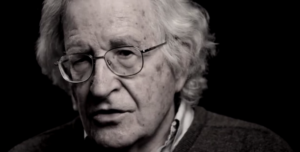
Noam Chomsky
Since the start of the war in Ukraine, there has been a lot of speculation about Russia’s military strategy and President Vladimir Putin’s geostrategic aims. Indeed, it is still unclear what Putin wants, and Ukrainian President Volodymyr Zelenskyy’s repeated offers of a face-to-face meeting have been rejected by Moscow, although that could soon change. In the meantime, the destruction of Ukraine continues unabated, while European countries and the United States ramp up military spending in what is perhaps the clearest indication yet that a new Cold War may be underway. The North Atlantic Treaty Organization (NATO) is reinforcing its eastern front and there are no signs from Washington that the Biden administration is interested in engaging in constructive diplomacy to end the war in Ukraine. In fact, President Joe Biden is adding fuel to the fire by using highly inflammatory language against the Russian president.
In the interview that follows, world-renowned scholar and leading dissident Noam Chomsky delves into the latest developments concerning the war in Ukraine, but also takes us into a tour de force exposé of extreme selectivity in moral outrage on the part of the U.S. and, additionally, shares some of his insights into the contemporary political culture in the U.S., which includes the reshaping of the ideological universe of the Republican Party, political fervor and book banning.
C.J. Polychroniou: Noam, the latest reports about the war in Ukraine indicate that Russia seems to be shifting its strategy, with an intent of partitioning the country “like North and South Korea,” according to some Ukrainian officials. In the meantime, NATO decided to reinforce its eastern front, as if Russia has plans to invade Bulgaria, Romania and Slovenia, while Washington not only continues to be mum about peace in Ukraine, but we heard Biden engage in some toxic masculinity talk against Putin in his recent visit to Poland, prompting, in turn, French President Emmanuel Macron to warn against the use of inflammatory language as he is actually trying to secure a ceasefire. In fact, even American veteran diplomat Richard Haass said that Biden’s words made a dangerous situation even more dangerous. Posing this question in all sincerity, does the U.S. ever think that conflicts can be resolved by any other means other than through intimidation and the use of continuous force?
Noam Chomsky: There are several questions here, all important, all worth more discussion than I can try to give here. Will go through them pretty much in order.
On the current military situation, there are two radically different stories. The familiar one is provided by Ukraine’s military intelligence head, Gen. Kyrylo Budanov: Russia’s attempt to overthrow the Ukrainian government has failed, so Russia is now retreating to the occupied south and east of the country, the Donbas region and the eastern Azov sea coast, planning a “Korean scenario.”
The head of the Main Operational Directorate of the General Staff of the Armed Forces of the Russian Federation, Col. Gen. Sergey Rudskoy, tells a very different story (as of March 25): a rendition of George W. Bush’s “Mission Accomplished” in Iraq, though without the dramatic trappings:
The main goal of the “special military operation” was to defend the Donbass People’s Republic from the genocidal assaults of Ukrainian Nazis over the past eight years. Since Ukraine rejected diplomacy, it was necessary to extend the operation to “demilitarization and denazification” of Ukraine, destroying military targets with great care to spare civilians. The main goals have been efficiently achieved exactly according to plan. What remains is the full “liberation of Donbass.”
Two tales, same ending, which I presume is accurate.
The West, quite plausibly, adopts the former story. That is, it adopts the story that tells us that Russia is incapable of conquering cities a few miles from its border that are defended by what are limited military forces by world standards, supported by a citizen’s army.
Or does the West adopt this story? Its actions indicate that it prefers the version of General Rudskoy: an incredibly powerful and efficient Russian military machine, having quickly achieved its objectives in Ukraine, is now poised to move on to invade Europe, perhaps overwhelming NATO just as efficiently. If so, it is necessary to reinforce NATO’s eastern front to prevent the impending invasion by this monstrous force.
Another thought suggests itself: Could it be that Washington wishes to establish more firmly the great gift that Putin has bestowed on it by driving Europe into its grip, and is therefore intent on reinforcing an eastern front that it knows is under no threat of invasion?
So far, Washington has not strayed from the position of the joint statement that we discussed earlier. This crucially important policy statement extended Washington’s welcome to Ukraine to join NATO and “finalized a Strategic Defense Framework that creates a foundation for the enhancement of U.S.-Ukraine strategic defense and security cooperation” by providing Ukraine with advanced anti-tank and other weapons along with a “robust training and exercise program in keeping with Ukraine’s status as a NATO Enhanced Opportunities Partner.”
There is much learned discussion plumbing the deep recesses of Putin’s twisted soul to discover why he decided to invade Ukraine. By moving on to criminal aggression, he carried a step forward the annual mobilizations on Ukraine’s borders in an effort to elicit some attention to his unanswered calls to consider Russia’s security concerns, which are recognized as significant by a host of top U.S. diplomats, CIA directors, and numerous others who have warned Washington of the foolishness of ignoring these concerns.
Perhaps exploring Putin’s soul is the right approach to understanding his decision in February 2022. There is, perhaps, another possibility. Perhaps he meant what he and all other Russian leaders have been saying since former President Boris Yeltsin, 25 years ago, about neutralization of Ukraine; and perhaps, even though the highly provocative joint statement has been silenced in the U.S., Putin might have paid attention to it and therefore decided to escalate the disregarded annual efforts to direct aggression.
A possibility, perhaps.
The press reports that, “Ukraine is ready to declare neutrality, abandon its drive to join NATO and vow to not develop nuclear weapons if Russia withdraws troops and Kyiv receives security guarantee…”
That raises a question: Will the U.S. relent, and move to expedite efforts to save Ukraine further misery instead of interfering with these efforts by refusing to take part in negotiations and maintaining the position of the policy statement of last September?
The question brings us to Biden’s ad-libbed call for Putin to be removed, offering Putin no escape. Biden’s statement, recognized to be a virtual declaration of war that could have horrifying consequences, did cause considerable consternation worldwide, not least among his staff, who hastened to ensure the world that his words didn’t mean what they said. Judging by the stance of his close circle on national security issues, it’s hard to be confident.
Biden has since explained that his comment was a spontaneous outburst of “moral outrage,” revulsion at the crimes of the “butcher” who rules Russia. Are there some other current situations that might inspire moral outrage?
It’s not hard to think of cases. One of the most terrifying is Afghanistan. Literally millions of people are facing starvation, a colossal tragedy. There is food in the markets, but lacking access to banks, people with a little money have to watch their children starve.
Why? A major reason is that Washington is refusing to release Afghanistan’s funds, kept in New York banks in order to punish poor Afghans for daring to resist Washington’s 20-year war. The official pretexts are even more shameful: The U.S. must withhold the funds from starving Afghans in case Americans want reparations for crimes of 9/11, for which Afghans bear no responsibility. Recall that the Taliban offered complete surrender, which would have meant turning over the al-Qaeda suspects. (They were only suspects at the time of the U.S. invasion, in fact long after as the FBI confirmed.) But the U.S. firmly responded with the edict that, “The United States is not inclined to negotiate surrenders.” That was Defense Secretary Donald Rumsfeld, echoed by George W. Bush.
If there is any moral outrage about this current crime, it’s hard to detect. It is far from the only case. Are there some lessons to be learned? Perhaps, but though they seem simple enough, maybe they merit a few words.
Moral outrage over Russian crimes in Ukraine is understandable and justified. The extreme selectivity in moral outrage is also understandable, but not justified. It is understandable because it is so common.
It is hard to think of a more elementary moral principle than the Golden Rule — in the Jewish tradition, the rule that “what is hateful to you, do not do to others.”
There is no rule that is more elementary, or more consistently violated. That is also true for a corollary: Energy and attention should be focused on where we can do most good. With regard to international affairs, that typically means focusing on the actions of one’s own state, particularly in more or less democratic societies where citizens have some role in determining outcomes. We can deplore crimes in Myanmar [also known as Burma], but we cannot do much to alleviate the suffering and misery within Myanmar. We could do a lot to help the miserable victims who fled or were expelled, the Rohingya in Bangladesh. But we don’t.
The observation generalizes. The principle is indeed elementary. To say that actual practice fails to conform to it would be a vast understatement.
It is not that we do not understand and honor the principle. We do, with true passion, when the principle is observed in the societies of official enemies: We greatly admire the Russians who are courageously defying the harsh Russian autocracy and protesting the Russian invasion. That keeps to a long tradition. We always greatly honored Soviet dissidents who condemned the crimes of their own state, and never cared at all about what they said about others, even when they applauded major U.S. crimes. Same with Chinese and Iranian dissidents. It is only when the principle applies to ourselves that it can barely even be contemplated.
One dramatic illustration among many is the U.S. invasion of Iraq. It can be criticized as a “strategic blunder” (according to Barack Obama) but not as what it was: unprovoked and murderous aggression, the “supreme international crime” according to the Nuremberg judgment.
Accordingly, the dramatic selectivity in moral outrage is understandable, and another outrage. In some weak form of extenuation, we can add that it is no U.S. invention. Our predecessors as hegemonic imperial powers were no different, including Britain; arguably worse, though after centuries of disgraceful behavior there is now some beginning of reckoning.
Turning to the next question, does the U.S. ever think that conflicts can be resolved by peaceful means? No doubt. There are examples, which deserve a closer look. We can learn a lot from them about international affairs, if we choose.
Right at this moment, we are all called upon to celebrate a remarkable example of U.S. initiative to resolve conflict by peaceful means: the ongoing “Negev Summit” of Israel and four Arab dictatorships, which will “expand the potential for peace and conflict resolution across the region,” according to Secretary of State Antony Blinken, Washington’s representative at the historic meeting.
The summit brings together the most brutal and violent states within the U.S. orbit, based on the Abraham Accords, which formalized the tacit relations between Israel, the United Arab Emirates (UAE) and Morocco, with Saudi Arabia present implicitly via its satellite, the Bahrain dictatorship. They are joined at the summit by Egypt, now suffering under the most vicious dictatorship in its ugly history, with some 60,000 political prisoners and brutal repression. Egypt is the second-largest recipient of U.S. military aid, after Israel. There should be no need to review the sordid record of the leading recipient, recently designated the apartheid state by Human Rights Watch and Amnesty International.
The UAE and Saudi Arabia share primary responsibility for what the UN describes as the world’s worst humanitarian crisis: Yemen. The official death toll last year reached 370,000. The actual toll no one knows. The shattered country is facing mass starvation. Saudi Arabia has intensified its blockade of the sole port used for food and fuel imports. The UN is issuing extreme warnings, including the threat of imminent starvation of hundreds of thousands of children. The general warnings are echoed by U.S. specialists, notably Bruce Riedel of the Brookings Institution, formerly the top CIA analyst on the Middle East for four presidents. He charges that the Saudi “offensive action” should be investigated as a war crime.
The Saudi and Emirati air forces cannot function without U.S. planes, training, intelligence, spare parts. Britain is taking part in the crime, along with other Western powers, but the U.S. is well in the lead.
The Moroccan dictatorship was also welcomed by the Trump peace initiative. In his last days in office, Donald Trump even formally recognized Morocco’s annexation of Western Sahara in defiance of the UN Security Council and the International Court of Justice — incidentally firming up Morocco’s virtual monopoly of potassium, a vital and irreplaceable resource, now within U.S. domains.
Authorizing of Morocco’s criminal annexation should have come as no surprise. It followed Trump’s recognition of Israel’s annexation of the Syrian Golan Heights and of vastly expanded Greater Jerusalem, in both cases in violation of Security Council orders. Trump’s support for violation of international law was undertaken in both cases in the splendid isolation that the U.S. often enjoys, as in its torture of Cuba for 60 years.
These are just further illustrations of the commitment to the “rule of law” and the sanctity of sovereignty that Washington has demonstrated for 70 years in Iran, Guatemala, Brazil, Chile, Iraq, and on and on — the commitment that requires the U.S. to extend the welcome mat to Ukraine to join NATO.
The summit that we are now celebrating is a direct outgrowth of the Abraham Accords. For implementing them, Jared Kushner has been nominated for the Nobel Peace Prize (by Harvard Law Professor Alan Dershowitz).
The Abraham Accords and today’s Negev Summit are by no mean the first time that Washington has demonstrated its dedication to peaceful settlement of conflicts. After all, Henry Kissinger won the Nobel Peace Prize for his achievements in bringing peace to Vietnam, shortly after issuing one of the most extraordinary calls for genocide in the diplomatic record: ”A massive bombing campaign in Cambodia. Anything that flies on anything that moves.” The consequences were horrendous, but no matter.
Kissinger’s prize brings to mind the reported proposal by an Israeli physicist that [founder of Israel’s Likud party and former prime minister] Menachem Begin should be granted the physics prize. When asked why, he said: “Look, he’s been granted the Peace Prize, so why not the Physics Prize?”
Sometimes the quip is unfair. Jimmy Carter surely deserved the Peace Prize that was awarded for his efforts after he left the presidency, though the award committee emphasized that while still in office, President Carter’s “vital contribution to the Camp David Accords between Israel and Egypt [was] in itself a great enough achievement to qualify for the Nobel Peace Prize.”
Carter’s 1978 efforts were also no doubt undertaken with the best of intentions. It didn’t quite turn out that way. Menachem Begin did agree to abandon Israel’s project of settling the Egyptian Sinai but insisted that Palestinian rights should be excluded from the accords, and illegal settlement sharply increased under Ariel Sharon’s direction, always with vital U.S. aid and in violation of Security Council directives. And as Israeli strategic analysts quickly pointed out, removal of the Egyptian deterrent freed Israel to escalate its attacks on Lebanon, leading finally to the U.S.-backed 1982 invasion that killed some 20,000 Lebanese and Palestinians and destroyed much of Lebanon, with no credible pretext.
Ronald Reagan finally ordered Israel to end the assault when the bombing of the capital city of Beirut was causing international embarrassment to Washington. It of course complied but maintained its control of South Lebanon with constant atrocities against what it called “terrorist villagers” resisting the brutal occupation. It also established a vicious torture chamber in Khiam, which was kept as a memorial after Israel was forced finally to withdraw by Hezbollah guerrilla warfare. I was taken through it before it was destroyed by Israeli bombing to erase memory of the crime.
So, yes, there are some cases when the U.S., like other hegemonic imperial powers before it, has sought to resolve conflicts by peaceful means.
Back home, Republicans are backing up strong policies against Russia, although their “Great Leader” keeps changing his tune about Putin in order to stay in line with ongoing developments. The question here is this: Why is there still support among GOP members for Russia and Putin, especially on the far right of the political spectrum? What’s motivating the far right in the U.S. to break ranks with the Republican Party over Russia when the overwhelming majority of public opinion in the country is in support of Ukraine?
It’s not just Russia and Ukraine. While Europe has condemned Prime Minister Viktor Orbán’s “illiberal democracy” in Hungary, it has become the darling of much of the American right. Fox News and its prime broadcaster Tucker Carlson are in the lead, but other prominent “conservatives” are joining in with odes to the proto-fascist Christian nationalist regime that Orbán has imposed while shredding Hungarian freedom and democracy.
All of this reflects a conflict within the Republican Party — or to be more accurate, what remains of what was once a legitimate political party but is now ranked alongside of European parties with neo-fascist origins. Trump accelerated tendencies that trace back to Newt Gingrich’s takeover of the party 30 years ago. And Trump is now being outflanked from the right, difficult as that was to imagine not long ago. Much of the leadership is drifting towards the Orbán model or beyond, bringing a worshipful mass base with them. I think the debate within the party over Russia and Ukraine should be considered against this background.
GOP lawmakers are intensifying efforts to ban books on race, as if slavery and racial oppression in the U.S. are figments of one’s imagination instead of historical facts. Are the pushes to ban books and suppress votes linked? Do these developments represent yet another indication that a civil war may be brewing in the U.S.?
Book-banning is nothing new in the U.S. and suppressing votes of the “wrong” people is as American as apple pie, to borrow the cliché. They are now returning with force as the Republican organization, soon to retake power it seems, moves towards a kind of proto-fascism. Some careful analysts predict civil war. At the very least, a serious internal crisis is taking shape. There has long been much talk about American decline. To the extent that it is real, the major factor is internal. If we look deeper, much of the internal social decay results from the brutal impact of the neoliberal programs of the past 40 years, topics we’ve discussed before. It’s bad enough when Hungary drifts towards Christian nationalist proto-fascism. When that happens in the most powerful state in world history, the implications are ominous.
Imposing harsh sanctions on countries that refuse to go along with Washington’s commands is a long-established tactic on the part of the U.S. In fact, even scholars living in countries under sanctions are treated as undesirables. And the overall political culture in the U.S. is not too keen at all on permitting dissident voices to be widely heard in the public arena. Do you wish to comment on these foundational features of the political culture in the United States?
This is too large a topic to take up here. And much too important for casual comment. But it’s worth remembering that, once again, it is nothing new. We all recall when the august Senate changed French fries to “freedom fries” in furious reaction to France’s impudent refusal to join in Washington’s criminal assault on Iraq. We may see something similar soon if President Macron of France, one of the few reasonable voices in high Western circles, continues to call for moderation in words and actions and for exploring diplomatic options. The easy decline to scaremongering goes back much further, reaching comic depths when the U.S. entered World War I and all things German instantly became anathema.
The plague you mention is not confined to U.S. shores. To take one personal example, I recently heard from a colleague that an article of his was returned to him, unread, by a highly respected philosophy journal in England, with a notice that the article could not be considered because he is a citizen of a country under sanctions: Iran.
The sanctions are strongly opposed by Europe, but as usual, it submits to the Master, even to the extent of banning an article by an Iranian philosopher. Putin’s great gift to Washington has been to intensify this subordination to power.
I can add many examples right here, some from my own personal experience, but it should not be overlooked that the malignancy spreads well beyond.
We live in dangerous times. We may recall that the Doomsday Clock abandoned minutes and shifted to seconds under Trump, and is now set at 100 seconds to midnight — termination. The analysts who set the clock give three reasons: nuclear war, environmental destruction, and collapse of democracy and a free public sphere, which undermines the hope that informed and aroused citizens will compel their governments to overcome the dual race to disaster.
The war in Ukraine has exacerbated all three of these disastrous tendencies. The nuclear threat has sharply increased. The dire necessity of sharply reducing fossil fuel use had been reversed by adulation of the destroyers of life on Earth for saving civilization from the Russians. And democracy and a free public sphere are in ominous decline.
It is all too reminiscent of 90 years ago, though the stakes are far higher today. Then, the U.S. responded to the crisis by leading the way to social democracy, largely under the impetus of a revived labor movement. Europe sank into fascist darkness.
What will happen now is uncertain. The one certainty is that it is up to us.
Copyright © Truthout. May not be reprinted without permission.
C.J. Polychroniou is a political scientist/political economist, author, and journalist who has taught and worked in numerous universities and research centers in Europe and the United States. Currently, his main research interests are in U.S. politics and the political economy of the United States, European economic integration, globalization, climate change and environmental economics, and the deconstruction of neoliberalism’s politico-economic project. He is a regular contributor to Truthout as well as a member of Truthout’s Public Intellectual Project. He has published scores of books and over 1,000 articles which have appeared in a variety of journals, magazines, newspapers and popular news websites. Many of his publications have been translated into a multitude of different languages, including Arabic, Chinese, Croatian, Dutch, French, German, Greek, Italian, Japanese, Portuguese, Russian, Spanish and Turkish. His latest books are Optimism Over Despair: Noam Chomsky On Capitalism, Empire, and Social Change (2017); Climate Crisis and the Global Green New Deal: The Political Economy of Saving the Planet (with Noam Chomsky and Robert Pollin as primary authors, 2020); The Precipice: Neoliberalism, the Pandemic, and the Urgent Need for Radical Change (an anthology of interviews with Noam Chomsky, 2021); and Economics and the Left: Interviews with Progressive Economists (2021).






